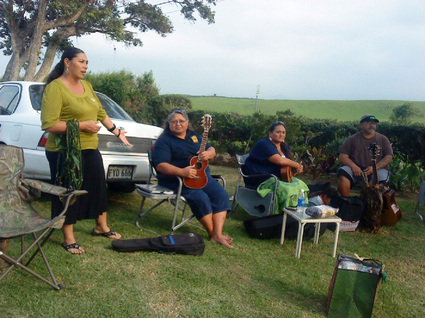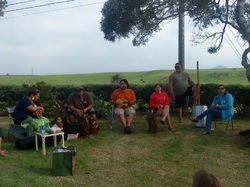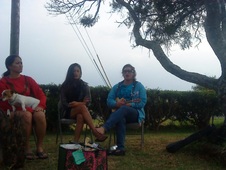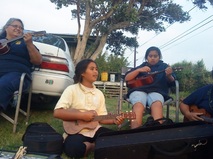The Garage Light is On: Nā Mele ʽO Nā Bertelmann
Hawaiian music is layered with the stories of travelers to this remote place. Before contact, the people of the islands called out in chant, seeking spiritual connections, telling stories of places, events and genealogies. It is thought that some of this early music was probably comprised of unique multi-part harmonies, which were then blended with the western based harmonies and melodies imported with the missionaries. Another layer was added to the music with the tide of visitors who brought a wave of stringed instruments; these too were absorbed to enrich creative musical possibilities. But beyond this, the music is layered with experiences. Pomai Bertelmann: “There’s songs that are really, really beautiful to listen to and they all have their own messages. Each song, whether it’s traditional or not has a story. Every one of them, if you listen carefully enough, if you pay attention to it enough, if you’re actually able to sit quietly and listen to it and become maʽa (familiar) to it, you recognize there’s a story in it.”
Hawaiian music is also a metaphor for lōkahi -- harmony or agreement. Musically the concept of lōkahi is expressed as a harmonic blending of voices: Ka hui maikaʽi ʽana o nā leo mele. Aunty Deedee Bertelmann: “For us, harmony is a big deal. We can’t sing and not have harmony, yeah? So with music, harmony is important, but when you look at life, harmony is also really important. We have to get along with each other. That’s what we based our life and our children’s lives on.” These are the layers and traditions of Hawaiian music that have traveled through the generations and call out from the Bertelmann garage on a regular basis.


As it was for many generations before, music is simply part of the tapestry of daily life in the Bertelmann and Keakealani ʽOhanas. Mele is considered synonymous with pule or prayer. Kealiʽi: “So we were taught as children and we continue even today to pule and today we’re going to pule in the form of a mele.” Ka hui maikaʽi ʽana o nā leo mele. Voices blended, all different but in perfect lōkahi they mele:
Hoʻonani i ka Makua mau,
Ke Keiki me ka ʻUhane nō,
Ke Akua mau hoʻomaikaʻi pū,
Ko kēia ao, ko kēlā ao. ʻĀmene.
Kealiʽi’s falsetto voice rings out on top, while the other voices call out in counterpoint. A “chicken skin” moment. The garage light is definitely on.
Aunty Deedee: “Playing music was a constant thing. I remember always coming to our home and music was always happening. Somebody always brought an instrument or picking up an instrument and music was always being sung. Then I remember because we were active church members going to church and of course we had an aunt who was the music director, who taught all the music and lead the music in church. So eventually I would hear, my mom was talking on the phone, and she would come off and say, ‘O.k. Aunty Thelma said there’s practice tonight,’ and we would have to go and practice with Aunty Thelma. So I’m sure that was part of it.”
Learning an instrument the Hawaiian way is done by: Nana ka maka (look with your eyes); hoʽolohe pepeʽiao (listen with your ears); paʽa kou waha (close your mouth); hana ka lima (work with your hands). Aunty Deedee: “How did I even learn to play the ukulele? I just remember having it in my hand. I can’t remember where it started. It must be cause my dad. If an ukulele is laying around, today it’s no different. If they see you playing they eventually pick it up. So one of my granddaughters, her name is Anuhea, she’s 16, she’s playing the guitar now and she’s fortunate that she has her Uncle Chadd but she also learns a lot on her own so I’m watching the process and she’s teaching herself. And then when Uncle Chadd’s here she’ll say, ‘Uncle, what about this and how do you do this?’ So I think it’s both. You learn a lot on your own and you learn a lot from others. She’s picking up a lot from the computer. Going on the computer and just learning from that.”

It was the same for Aunty Lorna’s garage. Because we used to go to Aunty Lorna’s house all the time, especially when Uncle Sol and Uncle Richard would come. The falsetto when the Hopiʽi brothers would sing. Amazing. Sometimes we’d be outside playing on the road or the backyard and we’d hear these haʽi that these men were singing and you’d come flying through to the front and you just kind of stand there like what is going on? The community was really good to us.”
Later, when Aunty Deedee married Uncle Clay Bertelmann and had her own family, the musical traditions were perpetuated. “It’s really something because my husband and I would be singing and then eventually the children were the ones who would take the lead, doing the melody and we were in the background doing the harmony. Later when we would talk afterward Dad would say, ‘Did you notice they were singing and we had to do the background for them?’, which is good because you could see this happening.”
Kuʽulei: Mentioning Uncle, Uncle Clayton Bertelmann is the father, husband, Uncle. But this hale, this kitchen, this house, was home to many kanikapila. Most of the time for no occasion. Sometimes for occasion. But this is a childhood memory. This house and music, Uncle Clayton. There’s one particular song, “Pua Hone”. For me, I hear that song and I see this house or the kitchen or Uncle.
Uncle Clay, voyaging canoe builder, captain, navigator, teacher contributed much in his too short life. Keliʽi : “My father passed away this year, 8 years ago. When he was in the hospital before he passed away I would go into the room before we were leaving the hospital to come home and I would sing this song to him, even if he was, I think at times he was really incoherent and he couldn’t respond, but I knew that he could hear me because of the expressions that would come to his face. I would sing this song to him every night because it reminded me of when we were children and how they would sing it to us. It’s a song called ‘E Kuʽu Morning Dew’ by Uncle Kimura.”
E Kuʻu Morning Dew
Words by Larry Kimura, Music by Eddie Kamae
My morning dew
Wait a moment
Pay attention
To what I call out
Wait
For me, for me
I remain yours
With love
Dawn breaks
And the wet dew sparkles
Causing a rosy color
On these cheeks
Up at Mānā
In the mist-shrouded highland
There, you and I
Will remain forever
There, you and I
Will remain forever
My morning dew
Wait a moment
Pay attention
To what I call out
Wait
For me, for me
I remain yours
With love
Dawn breaks
And the wet dew sparkles
Causing a rosy color
On these cheeks
Up at Mānā
In the mist-shrouded highland
There, you and I
Will remain forever
There, you and I
Will remain forever
E kuʻu morning dew
Alia mai, alia mai
Maliu mai ʻoe
I kaʻu e hea nei
E kali mai ʻoe
Iaʻu nei, iaʻu nei
ʻO wau iho nō
Me ke aloha
Wehe mai ke alaula
ʻOliliko nei līhau
E hoʻohehelo ana
I neia papālina
I uka o Mānā
I ka ʻiu uhiwai
Ma laila no kāua
E pili mau ai
Ma laila no kāua
E pili mau ai
Place
The ʽaina has inspired many Hawaiian mele; legend associated with particular places is connected to contemporary stories, linking place with the past and the future. Kealiʽi: “This mele I’m going to sing for you right now is a mele titled Nā Puʽu. If you look, the puʽu to my left is puʽu hokuʽula and the puʽu to my right is pu’u hoaʽhoaka and it’s a mele that compares those two pu’u to a pair of lovers, two friends of mine who are in a love affair. I wrote it to honor those two friends of mine. On the western facing slope there are two ohia trees and you can only see one from here. When I wrote the mele I was down in Lalamilo where you can actually see the trees and as I was sitting there composing the mele, those two ohia trees reminded me of the story of the lovers ohia and lehua. So in this mele it’s kind of intertwined this love story of ohia and lehua. But puʽu hokuʽula is the place also where the god and goddess Wao and Makuakuamana were wed. That landscape in particular for me represents the aloha between two people.”
Nā Puʽu*
Kuʽulei: “I have something to interject. If you do not know, now you will. Brother Kealiʽi is the 2011 Kindy Sproat falsetto contest winner. And this is the song he won it with.” As Kealiʽi sings, we look out across the plains of Mauna Kea stretching behind him and feel Kealii’s strong connection to the puʽu behind us, we can imagine for a moment that we have been invited into the great stories of this land.
Kealiʽi: It was an honor to enter the falsetto contest this year. I entered for many reasons. There was a few times that I got to go and sit on the lanai at Makanikahio and sit with Uncle Kindy before he passed away. And it was an honor because. Our families were pili together. My grandfather and their ʽohana, there was such a closeness there. This mele I’m going to sing is a song that Uncle sang and if I’m not mistakes it was a song he learned when he was younger from the people in Miloliʽi. And really it’s a very simple song and it’s a song that just kind of talks about the delicacies from the ocean that we kanaka love to eat. I call it the fish song because I don’t think there was really a formal title for it. It was just a mele that he sang that talks about different types of fish and what you eat of that fish.”
Fish Song*
Kealiʽi: “My sister Lauaʽe is going to sing this song. Written by Uncle Eddie Kamae and Mary Kawena Pukui. So Tūtū Pukui is from Kaʽu and lived on Oʽahu in her adult life. When they wrote this song, she went back to Kaʽu with Uncle Eddie and wrote this song about places she came from.”
| The Path of the Jeep If you’re getting in the Jeep The road we travel will be long, and you’ll be tossed about On all the bumps and rocky dips And by our dodging of cactus and koa haole We startled the cattle, and they ran away Thus did we reach the shore of Waikapuna And on from there to delightful Pā‘ula Where we saw Puhi‘ula cave Then we returned by Jeep to Nā‘ālehu It’s such a joy to travel with friends Together we pushed on to Kalae and Kaulana And saw the wondrous water of Palahemo Now we’ve reached the home of a dear friend And relax in the cool serenity of Wai‘ōhinu Thus ends our song, its message is given with love It honors the land of the Hā‘ao rain. | Ke Ala a ka Jeep Inā ‘oe e kau ana i ke ka‘a Jeep He loa ke ala e hele ai, he kāhulihuli Ma nā pi‘ina nā ihona piha pōhaku ‘Alo ana i nā pānini me nā ‘ēkoa Ho‘opū‘iwa i nā pīpī a holo i kahi ‘ē Pēlā mākou i hiki ai i kai o Waikapuna A mai laila a Pā‘ula me kona hiehie ‘Ike aku i ke ana ‘o Puhi‘ula Ho‘i hou aku i Nā‘ālehu me ka ka‘a Jeep Hau‘oli ka helena me nā makamaka Alu aku i Kalae a me Kaulana A ‘ike iā Palahemo wai kamaha‘o A hiki mai i ka hale o ka makamaka Luana i ka la‘i ‘olu o Wai‘ōhinu Ha‘ina ka puana me ke aloha No ka ‘āina ka ua o Hā‘ao |
The ranching life style is inextricably linked to Hawaiian music. Pomai: “… beyond the fact that Kuʽulei and us are family and we’re related through culture, but [we are connected] more specifically through our ranching lifestyle. That lifestyle actually afforded us the opportunity to be with a lot of families. And all those families sang. Whenever rodeo was pau, we sang, whenever rodeo was happening and we didn’t have to be roping or racing or something like that, we were under the trailers, parked side by side with the canvas over and we were cooking and singing. We were really blessed to be raised in a good community where we always got together, equally important to what we got from home, that’s really what helped us too, to learn as much as we have. There’s that reinforcement too, not just within the household but within the community too.”
Kuʽulei: “…growing up and being around the cowboys. Their fun songs; songs that have been way into the night, early in the morning. And if you want, just to call them kolohe songs, or songs that have a rascal nature to them. When you have a chance to hear these songs, sometimes they make sense, sometimes not at all. But, you know these are the times you might find my father dancing on the table. When you hear him go ‘Batman’, that’s one of those songs.”
Kealiʽi: “We were raised singing and to love Hawaiian music. My father loved Hawaiian music. ‘The Sons of Hawaii’ records, we grew up listening to that. We had our own ranch, we were raised on the ranch. My dad them entered rodeo and they did those sorts of things. The music comes with the lifestyle and because they were cowboys, we loved country music and we still do. I’m hoping that my sister will sing a song.”
Pomai: “You know, just cause you like to sing, doesn’t mean you know all the words. We grew up watching Roy Anthony. I don’t know if anyone remembers Roy Anthony, but he was a big time live deal for us over here as little kids. And we were really stoked because he’d always end up over here at our parties, through some way shape or form.”
Don’t Toss us Away
By Patty Loveless
Well It seems that everyone we've known
Their love's grown cold will
Will ours stand as stone?
One by one they break.
It's such a shame.
and now you say that you want to do the same.
CHORUS
Don't toss us a-way so thoughtlessly
It just ain't right
Oh can't you see
I still love you
I want you to stay
Darling please, don't toss us away
(ending Darling please, don't toss us away.)
Well just think of all that we've been through
The world we're building me and you
How could all those years be tossed away
In just one moment in just one day.
CHROUS
Don't toss us away It just ain't right
To let love just die without a fight
I still love you
I Want you to stay
Darling please
Don't toss us away
So now I'm asking once again to understand to be my friend
Oh it hurt so bad to think you'd go Still the same I love you so.
Waʽa
The Bertelmann ʽOhana, musicians, dancers, composers and ranchers, but they are also of the sea. Uncle Clay was instrumental in the creation of Makaliʽi, the Big Island’s voyaging canoe as well as the on board educational program that now takes place annually. Pua Case: “I never knew this yard for music. I knew this yard and that kitchen table to be a place of very serious work and still is. Everytime I come here, we in serious planning. You know we doing something serious. And that’s how I know this yard. From the moment I sat on that table and Clayton Bertelmann was planning to build a canoe for his brother, I’ve know this house to be that. So they have a whole other side of them that hopefully we’ll bring out. They’re not just ranchers and not just singers, but they are also people of the sea.”
It was through the canoe that Pomai met her husband Chadd Paishon, who had sailed on the Hokuʽlea with Uncle Clay as his captain. Pomai: “Chadd’s family is a really amazing family. His mom is an Aki and his dad was a Paishon. His grandmother was a beautiful, beautiful song writer. Many songs of which you hear today being sung on the radio. He has roughly, currently alive first cousins, about 40 of them. Forty-seven of them. And they all sing.”
Chadd: “It’s no different like mom was saying for us for my family. My weekends were spent with my grandmother. Like Pomai said, she was a hula dancer, singer, composer. But for us growing up in our house on Oʽahu, all of us cousins all knew what we were doing on the weekend. We were going to be with grandma at somebody’s house. You were either going to be learning a song that she wrote or you were going to be learning the hula to that song. That’s the only two choices. Either you sing or you dance, you pick. It’s going to be one of the two. So I picked singing, but I also dance. Whenever we do have the chance to get together we all sing. I’ll share with you a song from my family. My grandmother’s brother wrote this some years ago.”
Chadd’s Grandmother’s song*
Keliʽi: “We’re not just people of the ʽaina, but we also love being in the kai. And what that affords us is the opportunity to travel throughout the Pacific. A song they learned in Tahiti. It’s a mele they kind of argue about whose song. It’s a Cook Island song but the Hawaiians sing it better.”
Cook Island Song*
Kuʽulei: “We have two beautiful girls join our hui. This is Hoʽoipo and Kaʽala, they are Mahoe (twins). Two more of Aunty Deedee’s grandchildren. Here’s Māmā, Pelika. Here there’s a noho right here. Pelika (mom) herself is a very talented ukulele player, singer. I had heard that the ʽohana had taken a trip to New Zealand, recently. I believe it was a conversation with Sister Pomai, and she said, ‘Oh, the Mahoe were very entertaining. They were really singing and playing, at different marae, they are really coming into their own.’ They are classmates with my middle daughter and I will say, Nahe will come home and say, ‘The sisters taught me F today.’ So Aunty, yet another example of how, it’s to hoʽomau and that Ipo and Kaʽala are teaching my little one.”

Kamalani o Keaukaha by Lena MaChaddo
Nani pua `a`ala onaona i ka ihu
E moani nei i ka pai pu hala
Mehana ku`u poli i ka hanu a ka ipo
I hui puia me ke aloha pumehana
Beautiful, flowers sweetly fragrant
Scented, gentle breeze in groves of hala
My heart is warmed by my darling's breath
Kiss sweetly fragrant with the warmest love
Carnation i wili `ia me maile lauli`i
`Iliwai like ke aloha pili polu
Darling sweet lei onaona o ia kaha
E ho`oipo nei me ke Kamalani o Keaukaha
Carnation entwined with the small-leaved maile
Love moistly clinging, level as water's surface
Darling, sweet fragrant lei of this place
Sharing love with Keaukaha's favored child
Pelika’s song*
Concluding Manaʽo
Pomai: “I think we’ve been very, very fortunate to grow up in an amazing place, but we’ve also been very fortunate to grow up with amazing people, who shared music with us. In many, many ways I don’t think they realized they were teaching us something that was invaluable. To understand and to become familiar with our language again and then to interpret and be able to understand all of the content and all of the lessons that are imbedded in those stories so our lives have been more rich because of that. That is something we value.”
Kuʽulei: “Last week at Aunty Lorna’s there were many highlights, but one of my highlights was hearing Uncle Willy say to his children, who were there and his two grandsons that were there that he was happy that they were hard workers. In essence to me he was conveying the message that he was proud of them. Then to hear Willy Boy say mahalo to his mother and his father for everything.”
Kealiʽi: “We were raised to never take things for granted. And I personally take the times that we have together as a family for granted. You never know when someone who is here now won’t be here. That particular manaʽo became very clear when my father left us. That was kind of a rude awakening. We are more grateful every day that we can still sing with my mom.”
Aunty Deedee: “I’m sitting there thinking to myself, so I’m their mother. When you’re children become adults I don’t feel like I’m a mother, I feel like I’m one of them. They’re adults now and I’m still at an age when I can still enjoy them fully. I have watched them rise to who they are every one of them and I like now that I can sit and I can listen to them. I do teach them everything they know, but they’re teaching me some stuff. In fact, today my children are my teachers. I attend classes that they teach. I have fun with them.”
Pua: “Only in Waimea could we have been with Roseann Barr and women from all over the world last night and sitting in this yard today. And I was just thinking how wonderful that is. We have such close connections with this ʽaina right here. Every house you could be in, in this homestead has some gift to offer.”
Kuʽulei: “We really wanted to highlight and showcase our people from the village. Our kānaka, our Hawaiian families from the homestead. This is as real as you’re going to get. I would say this is the exact reason we did these classes. This is aunty and her ʽohana. They have been singing probably since they were born. The next generation will take it after us. To sit in the Bertelmann yard and hear these exceptional stories, music, for me again is at the top of the list of examples of legacy and tradition. For us to come in for this hour and a half, perhaps two hours and just touch it.
*Lyrics not available at this time
 RSS Feed
RSS Feed
